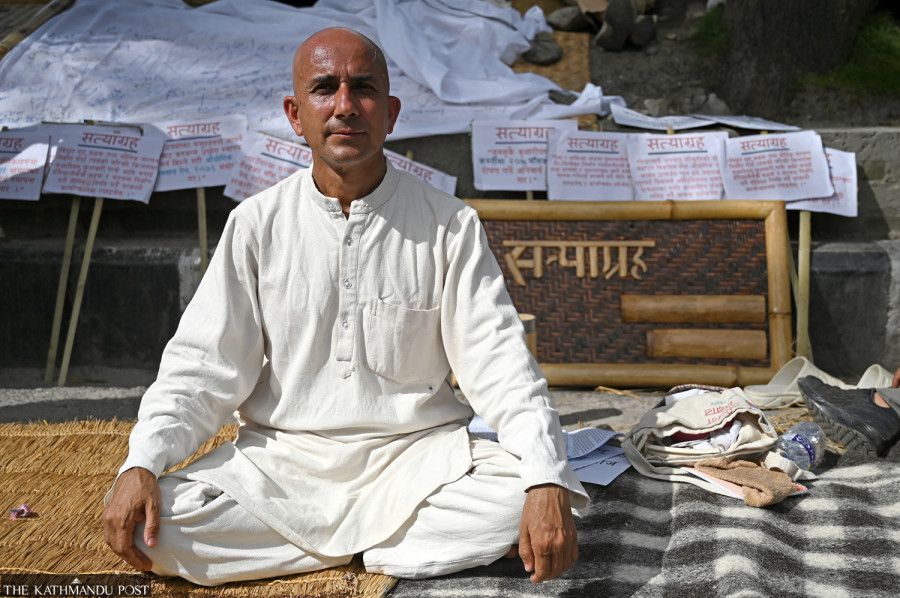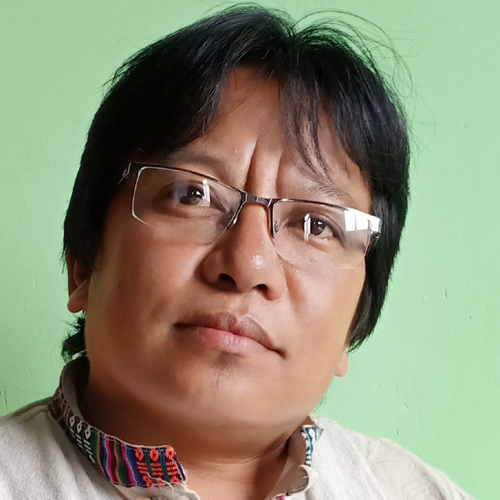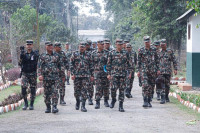National
Mayor launches peaceful protest demanding bamboo promotion policy
Diktel’s chief Tirtha Raj Bhattarai urges the federal government to adopt policies supporting local bamboo industry and employment.
Bimal Khatiwada & Dambar Singh Rai
Tirtha Raj Bhattarai, mayor of Diktel Rupakot Majhuwagadhi Municipality in Khotang district, is widely known as the ‘Bamboo Mayor.’ Whenever he visits government offices at Singh Durbar, officials greet him, saying, “Here comes the Bamboo Mayor,” because he consistently raises the bamboo issue and demands policies to promote its use and production.
Since his election in 2022, Bhattarai has actively pursued government support for local bamboo industries. He has visited ministries and related departments multiple times, meeting ministers and secretaries, pushing for policy formulation. Yet, no official policy or programme has been adopted.
He submitted a seven-point demand letter to Prime Minister KP Sharma Oli on July 7 and May 20, but says the government did not respond.
Frustrated by the government’s inaction, Bhattarai began a Satyagraha, a peaceful protest, on Sunday at Maitighar in Kathmandu, bringing bamboo products such as furniture, mats, and raw bamboo as symbols of his demands.
The municipality passed a resolution on June 23, instructing the mayor to stage a protest if their seven-point demands were not met. His three-day Satyagraha runs daily from 9 am to 5pm. He warned that if the government fails to act, he will begin an indefinite hunger strike.
Before the protest, Bhattarai on Thursday presented bamboo chairs and tables as gifts to prominent national figures—Speaker Dev Raj Ghimire, Chief Justice Prakash Man Singh Raut, and Vice-President Ramsahay Prasad Yadav—highlighting the value of bamboo products.
When elected, Bhattarai vowed to sit on bamboo furniture in his office. Initially, due to unavailability, he used a wooden chair made locally, but replaced it after four months with bamboo furniture crafted in ward 6 of his municipality. He hopes his example will inspire others to use bamboo.
He emphasises that locally sourced bamboo creates employment, ensures transparency, and reduces corruption. “The bamboo is local, and so are the jobs. Everyone knows where the bamboo is bought and sold. There is no chance of corruption while procuring bamboo items,” he said.
Bhattarai has formally requested the government to draft policies allowing bamboo and bamboo-based materials in construction and furniture. However, due to a lack of such policies, payments to bamboo producers have been delayed. Administrative officials have hesitated to approve payments, and technical staff have been unwilling to evaluate the materials, forcing Bhattarai to intervene to personally release payments amounting to over Rs300,000.
He complained that although the government talks about using local resources and materials, problems have arisen due to the lack of policy formulation.
“Primarily, the Ministry of Urban Development and the Ministry of Forests and Environment need to create the necessary policies. The Urban Development Minister has a major role in this, and I have urged him many times,” he said. “A policy must be made allowing the use of bamboo and bamboo-based products in building construction.”
Secretary Rajendra Prasad Mishra of the Ministry of Forests and Environment said the ministry already has a bamboo promotion strategy and supports the mayor’s efforts. He said that many of the mayor’s demands align with environmental goals and the government policy to promote indigenous products.
Inside Bhattarai’s office, bamboo furniture and décor are everywhere — chairs, tables, shelves, cups, and thermoses made of bamboo. Deputy Mayor Bisan Rai’s office also features bamboo furniture. The municipality has even built a lactation room entirely out of bamboo.
Bhattarai is committed to boosting local prosperity through bamboo promotion. “Bamboo is abundant here, and it can help farmers earn a livelihood,” he said.
In February 2025, the municipality hosted the first National Bamboo Conference, which produced a 35-point declaration focused on bamboo product manufacturing, marketing, and income generation.
Beyond bamboo, Bhattarai demands stronger climate change laws, mandatory use of bamboo and raw materials in government buildings, laws allowing local governments to impose extra taxes on plastic-producing industries, and stricter regulations on environmental exploitation and illegal industries like stone crushers.
He also calls for officially declaring Khotang as Nepal’s ‘bamboo capital’ and demands government compensation for farmers displaced by monkeys and other wildlife, which has increased migration in hill areas.




 20.22°C Kathmandu
20.22°C Kathmandu















